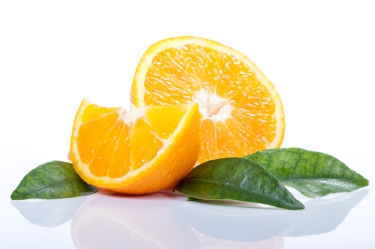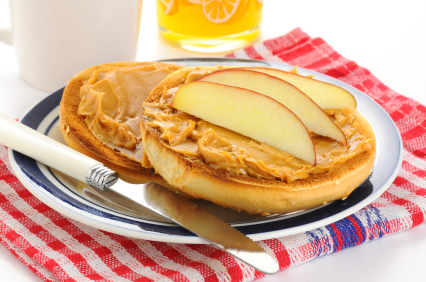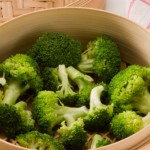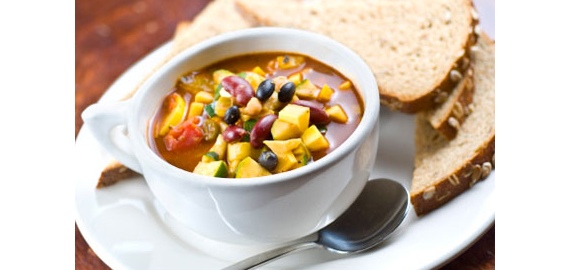Eat This, Not That: Breakfast Edition
Eat This
Not That
Orange Juice
With about 60 calories and 3 grams of fiber, a whole orange is more than orange juice. You could have 2 oranges for the same calories in a cup of juice, plus the bonus of 6g of fiber. Adding a piece of fruit to your breakfast is an easy way to amp up your nutrients. Switch it up with a variety of colors and flavors, like berries, pineapple, kiwi, melon, and bananas.
A mere cup of juice gives you about 112 calories, which is double the amount in one orange. With only about half a gram of fiber to slow down the release of sugars, you're going to feel hungrier faster than you would if you ate the whole fruit. Skip the fruit juices, and make it a habit to enjoy real fruit with your breakfast.

Sprouted Cinnamon Raisin Toast
Raisin Toast
Sprouted bread is made from sprouted whole grains instead of flour, which increases the nutrient and protein content. The sprouting process converts some of the carbohydrates in the grains to protein. Because most sprouted grain breads are comprised of several different grains, they provide a more diverse array of amino acids. Each slice has 80 calories, 2g fiber, and 3g protein.
Breads made from processed grains turn to sugar quickly in your body and don't have much to offer as far as nutrition. Enriched bread consists of the endosperm of the wheat kernel and provides carbohydrates, but is missing the wheat bran and wheat germ sources of fiber, vitamins, and minerals. This type of bread won't be as satisfying as a 100% whole wheat bread. One slice has 71 calories, 1g fiber, and 2g protein.
Peanut Butter
Cream Cheese
For 100 calories of peanut butter, you get 4g protein, 1g fiber, and 8g healthy fats in one tablespoon. Nut butters are heart-healthy and satisfying. For variety, try almond butter or sunflower seed butter. Add some no-sugar added jam for sweetness.
One tablespoon of cream cheese has 50 calories, 1g protein, no fiber, and 5g fat (mostly the unhealthy type). You'll be hungry again very soon with this toast topper. Avoid the cream cheese, butter, or margarine that won't give your body the nutrition it needs to start out your day right.

Cheerios
Honey Smacks
A cup of Cheerios offers 100 calories, 3g protein, 3g fiber, and only 1g sugar. Look for cereals like this that have very little added sugar, and check to see that they are made with 100% whole grains, which are a great source of fiber. Don't be fooled by marketing claims on the front of the box - turn it over and check to see what it is made with.
Sugary cereals like Honey Smacks are almost 50% sugar! In one ¾-cup serving, you get 100 calories, 2g protein, 1g fiber, and 15 g sugar. If sugar is the first ingredient, put the box back on the shelf. It also contains hydrogenated oils, also called trans-fats, which are associated with heart disease. Always read the ingredient list to know what you are getting.
Rolled Oats
Granola
A ½-cup of plain oats provides 150 calories, 6.5g protein, and 4g fiber. Just add hot water or an unsweetened non-dairy milk, and let them steep for a few minutes. Top with fresh fruit or stir in a few raisins and nuts for flavor and added nutrition. They're great with peanut butter, too!
This varies by brand, but on average, a ½-cup of granola has 225 calories, 5g protein, and 4g fiber. Frequently misconstrued as a health food, granola often has high amounts of sugar and oil, which add empty calories. As with any packaged food, you should read the box to find out exactly what it contains.
Vegan Whole Wheat Pancakes
Traditional Pancakes
Make pancakes with: whole grain flour for fiber, unsweetened soymilk for a protein boost, and a mashed banana or applesauce instead of oil. Heat up half the amount of maple syrup you normally would use with half a cup of berries for a deliciously sweet fruit compote.
Made with white flour, regular pancakes offer lots of empty calories that will wreak havoc with your blood sugar levels. Refined grain pancakes topped with pure maple syrup is a recipe for a mid-morning energy crash. If you can't get whole grain, eat half the amount you normally would, and add a large serving of fruit.
Corinne Goff is a Registered Dietitian who is absolutely passionate about food, health, and nutrition. Corinne has a BA in Psychology from Salve Regina University and a BS in Nutrition from the University of Rhode Island. As a nutritionist, her objective is to help people reach their health goals by offering a personalized holistic approach to wellness that incorporates natural foods and lifestyle changes. She works together with her clients to develop daily improvements that they feel comfortable with and that are realistic. She believes that the focus on wholesome, nutrient-rich, real food, is the greatest possible way to become healthier, have more energy, decrease chances of chronic disease, and feel your best. For more information, please visit her website at RI Nutrition Housecalls.com.
-
7 Powerful Weight Loss Tips - Lose Weight Without Spending Any Money
Health experts around the world have con
-
How to love your body while losing weight
Page 1 of 9Prev Next >>Prev Next >>Learn how t
-
Asbestos Mesothelioma- A Deadly Disease
Asbestos- the Main Culprit behind Asbestos MesotheliomaAsbestos me
-
Stomach Fat - How To Burn It Off Quickly
Ask yourself - why do you have stomach fat? This question isnt meant a
-
Hoodia Gordonii - Amazing Weight Loss Results!
Hoodia Gordonii is a succulent plant that is found in the Kalahari
-
The Main Rationalizations for Not Succeeding at Dropping Weight
Losing weight can be difficult, and ther
- DON'T MISS
- Lungs, Liver & Heartburn: The Waist Training Connection You Didn’t Know
- Diet Pills and Fat Loss
- Mothers Working At Home
- If You Want To Live Longer Just Lose Weight
- How You Eat and What You Eat Could be Affecting Weight Loss
- Algonquin Personal Trainer Reveals Top 4 Weight Loss Mistakes
- Peanut Shrimp
- Is There Really A Simple Way To Lose Weight
- Reduce Body Weight Once And For With Lifestyle Changes
- Lose Weight Naturally And Healthily




